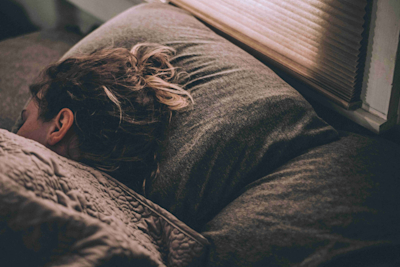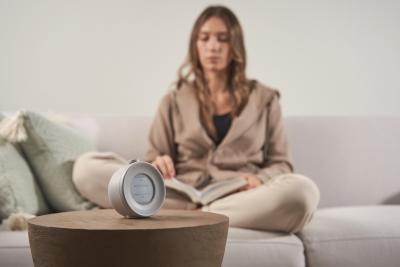
An Introduction to Meditation: Self-Awareness in Hard Times
Introduction to zen meditation with Zen Master Alexander Poraj-Żakiej that will help you regain balance and focus on the present moment.
Alexander Poraj-Żakiej is a zen master, one of the three successors of Benedictine and Zen Master Willigis Jäger. He is currently the spiritual director of the Benediktushof Mindfulness and Meditation Center in Holzkirchen (Germany), which is one of the largest centres of this type in Europe, founded in 2003. Find a quiet place and enjoy.
This 18-minute introduction to zen meditation with Zen Master Alexander Poraj-Żakiel will help you regain balance and focus on the present moment.
Full transcription of the video:
Several weeks ago, none of us had any idea to describe the situation we are currently facing. It is not personal, it is not only in Poland, Germany and in Europe, at the moment it is already all over the world.
This morning I read the news and that currently, there are almost 2.5 billion people in quarantine. In other words, something has stopped functioning as it did before.
We also stopped something that we thought was one of the only important things we couldn't live without. Suddenly, it turned out that a lot of things were put 'on hold'.
Nevertheless, life goes on and we are living. The sun is shining and there is a beautiful spring. Everything is flourishing, everything is living.
However, something has stopped functioning properly. Particularly, what we can call me, mine or our activities. They have stopped functioning. And together with that, all that we believe is the most important in our life has stopped working.
Everything stands still, quietness. That is why I would like to propose some small self-awareness activities for you in relation to what is happening.
Because we are all surprised by what is happening, for many of us, the situation is not easy. Not only because we have some fear that we can also get infected, but also many of us have really existential fears.
Because of the fact that our incomes are under the question, many of us are running businesses and companies. And all of that has stopped functioning properly.
All of the previously mentioned activities are related to each other. Nobody works only for themselves neither for a small group.
At the moment we just feel that we are all connected with each other in a great unpredictable way. All of our activities are connected and they collaborate only because they live in a constant state of giving or taking.
We are communication. We are taking and giving and many of these takings and givings, in their physical-economic way, have suddenly stopped operating properly.
What can we do about it? On the one hand, nothing. We should wait. We should wait until the threat that we are aware of begins to weaken. In other words, we have to wait. We would love to do something. We would love to fight.
If there would be a war, we would definitely fight as there would be an enemy. If somebody would attack us, even if there would be a fire or any other cataclysm, we could carry sandbags, we could extinguish fires, we could carry bricks, we could do something.
But at this moment we cannot do anything. We just have to wait. However, we have not learned to do so. That is why I would like to propose the art of waiting.
Let us take a look again at the condition, we are describing as 'waiting'. If we are in the state of waiting, it is a very specific form. Because it is a form of some sort of tensions, in which we are not really present, as we are not interested in what is happening. Only in the condition of waiting, we are waiting for something that must be. And what must be is actually a subject of our waiting. And what we have is not interesting enough and denied.
So, at this moment we are waiting for a vaccine, we are waiting for the pandemic to pass and we are waiting for another situation. At this point, if we are doing this, we deny what is present.
We deny our fear of the probable contagion, reject peace and silence. And we reject the situation which we are in. And here is a very important and interesting moment, which I would like to talk to you about. If we are waiting, then we will be impatient. Particularly, impatient with what we are waiting for, something that does not come as soon as we want it to happen.
It does not seem like something will be changed overnight. Quite the opposite. From our governments we hear that the quarantines or the lockdowns of offices or social life as silence or as slowdown, probably will be extended.
It might not be terminated within the due time we were provided with. Therefore, an impatience will appear in our waiting. In the word 'suffering', patience is exactly that acerbity and suffering. We are those who are making it.
Because suffering is the condition, in which we do not like what we have, it is called 'suffering' in Eastern and Western spirituality.
Consequently, we suffer while we're waiting for something that does not appear. We automatically reject what we are supposed to have. So, the art of waiting is a great art form. If we turn it into the art of communing and the ability to deal with what we have right now.
Please, take a look at the reality: We are happy that we live in Europe, where apart from many fears and complaints, our health systems are still working.
In many other countries, the situation is much worse. It is unpleasant to consider what is going on for many of us. It is new, strange.
However, is it really bad enough to reject it? In other words, take a look at what is going on. Is this literally not acceptable? And unpleasant because of this? As we call it.
Have a look at how your days look like. How your morning looks like when you wake up. You can stay home. Work is possible for many of us right now thanks to technology, systems are in place to work online. But we are at home.
That means we have more time. You see, if you are able to change your mode of life, your routine, a little bit. Make yourself a so-called 'program of the day'.
I recommend it as the more peace and quietness in many contemplative monasteries, the stronger is their program of the day. Because our mind cannot keep mindful by doing one thing for too long. That is why it is important to take this into account and, from time to time, change the activity. But, especially, from time to time. Please try, if you are able to start your day with the quietness and meditation.
Enjoy preparing breakfast. Enjoy buttering the bread. Enjoy the taste. You do not need to rush anywhere - your work is already at home. You do not have to hurry up. You do not have to catch the bus today. You can stay. Stay with what you have.
That is why when you find a taste for quietness, you can try the taste of toast with butter and jam. Smell again the aroma of coffee or tea. Look, who is sitting next to you. If there is no one around, then see how it feels by being alone in the room or kitchen.
Start working. Working on the awareness that we are not alone. From time to time, take a 5-minute break. Take a deep breath during the break and feel your body present with you. In front of your laptop or standing up.
Take a short walk in the room, if you can. Turn to the window. Open the window. Take a look outside. Breathe in the fresh air. You will see the sky, the sun, the clouds, the rain. You may see other people in other rooms. We are together, smile!
There is a short road to reach other people. Maybe someone is afraid. And maybe your smile will help someone. Just like a light tickle. That we are and that we live.
Make yourself lunch after work. Enjoy again the smell of cooking and spices. Feel the ingredients and taste your food. See, if any physical activity is possible.
There are many possibilities in different traditions: Qigong, Tai chi, Yoga, Feldenkrais and so on. I am not talking about gymnastics, I'm talking about body presence which has a tendency to increase thanks to many exercises. That is how you learn to inhabit your body. It increases and helps you to be present.
Take your time to read - for one hour or one hour and a half. Read something that in the moment, will inspire you. Something that will give you a positive feeling. See, if you can reduce a small amount of movies or other stimuli, which normally, would be used to compensate what we have - meaning that they are able to make you forget about something, to distract or run from that something.
See if you are able to increase the amount of time you stay with what you feel and taste. See if you can stay in touch with yourself while feeling, sitting, lying down, walking, cooking, eating, drinking. See if you can remain present, in your own body.
If you can inhabit your body and together with that inhabit your room, kitchen, flat or a balcony. Let yourself be. At this moment, now. Organize your time for phone conversations, Skype or any communications of that type. They are very important.
However, check from which moment they stop being a real communication, but rather an attempt just to kill time. Risk not killing this time. This is the right moment to realize that it is a shame to kill your time.
Time is priceless. Nobody has the power of time and nobody knows for how long we will be in what we call 'human being'. It would be a shame to kill time and drown it out.
Let yourself and others stay together in communication. Let yourself be true to who you are in silence. While feeling and breathing all that is and get used to it as one big open space. If we open ourselves to this silence and start practising this presence in the way I have described, it is possible that being present will come to us in a slightly easier way or maybe even delightfully.
Be. Simply, be. It always starts with being who you are and with the ability to handle yourself. We have barely been taught and, perhaps, almost never been.
This is what the spiritual paths of both the east and west teach us. We start with ourselves, at our place, near us. See if you are able to make these changes. Not too long in the beginning but systematically and consistently. Once again: do what you are doing. But do it consciously and see if you can enjoy it.
There are so many nice and sensual things which surround us, which we can touch, taste, drink, smell, everything is here. There is also something eye-catching - the spring. And this is also something for the breath. We still have unlimited access to food. We can survive it.
We have that much access to everything that our life is not actually standing still - it is still living through. And maybe we can use this time to start feeling the sense of it again. Summarizing, I would like to pay attention once again to what 'sense' actually means. We thought that the word 'sense' was some explanation for life. We say that my life makes sense, because: and here any explanation comes.
If it is like this, we should use the word 'explanation' and not 'sense.' The word 'sense' comes from 'sensitivity', meaning that it comes from the feeling of life. Life has any sense if we live it. We live through it by feeling it. We have to be in touch with our presence, inhabit our body in order to feel life and live through it by touching, feeling, breathing, drinking, eating, seeing and tasting what we have.
Let's starts our spiritual exercise not with an attractive story, but rather with the embodiment of the moment of reality. We have a lot of invitation to this. It does not matter if we live alone or with somebody. The current situation allows us to do so. It even forces us to deal with what we have.
Instead of thinking about the threats and what we cannot do, please pay attention to what we can actually do, what we have done and what we can live through. Because it gives us sense. It is sense.
This may be a greater sense and pleasure than many of the things we think are so important. Which turn out to be of little importance and worthless when compared to what is really happening.
Let's start with the meditation of everyday life. As you have seen, meditation of everyday life is not about a very specific way of meditation. Meditation of everyday life is about everyday experiences, it is about being present at this very moment. I wish a sensual, meaningful life to all of us - sensual living and the unity of being associated with it.
Thank you.
Did this introduction to meditation resonate with you?
We’d love to know what you think. If you’re interested in sharing your experiences with us or writing a guest post for us, send us an email via hello@mudita.com!
Please feel free to get in touch via social media (send us some photos or videos too), you can find us on Facebook, Twitter and Instagram, let’s connect! To learn more about Mudita, take a look at our website and our other posts.
Related stories

Sleep Tips: Preparing for Daylight Savings
Prepare for Daylight Savings with Mudita's expert sleep tips! Discover simple ways to improve sleep quality, enhance sleep hygiene, and wake up refreshed.

What Are the 6 Pillars of Self-Esteem?
Discover the 6 pillars of self-esteem for a balanced life. Learn how Mudita's products support personal growth, mindfulness, and purposeful living.

The Power of Wellness: 5 Research-Based Reasons of Self-Care
Self-care is a deliberate activity that you do to take care of your mental, physical, and emotional health.
If you'd like to receive the best stories from our blog, keep up to date with our progress and get notified about our product releases and special discounts.